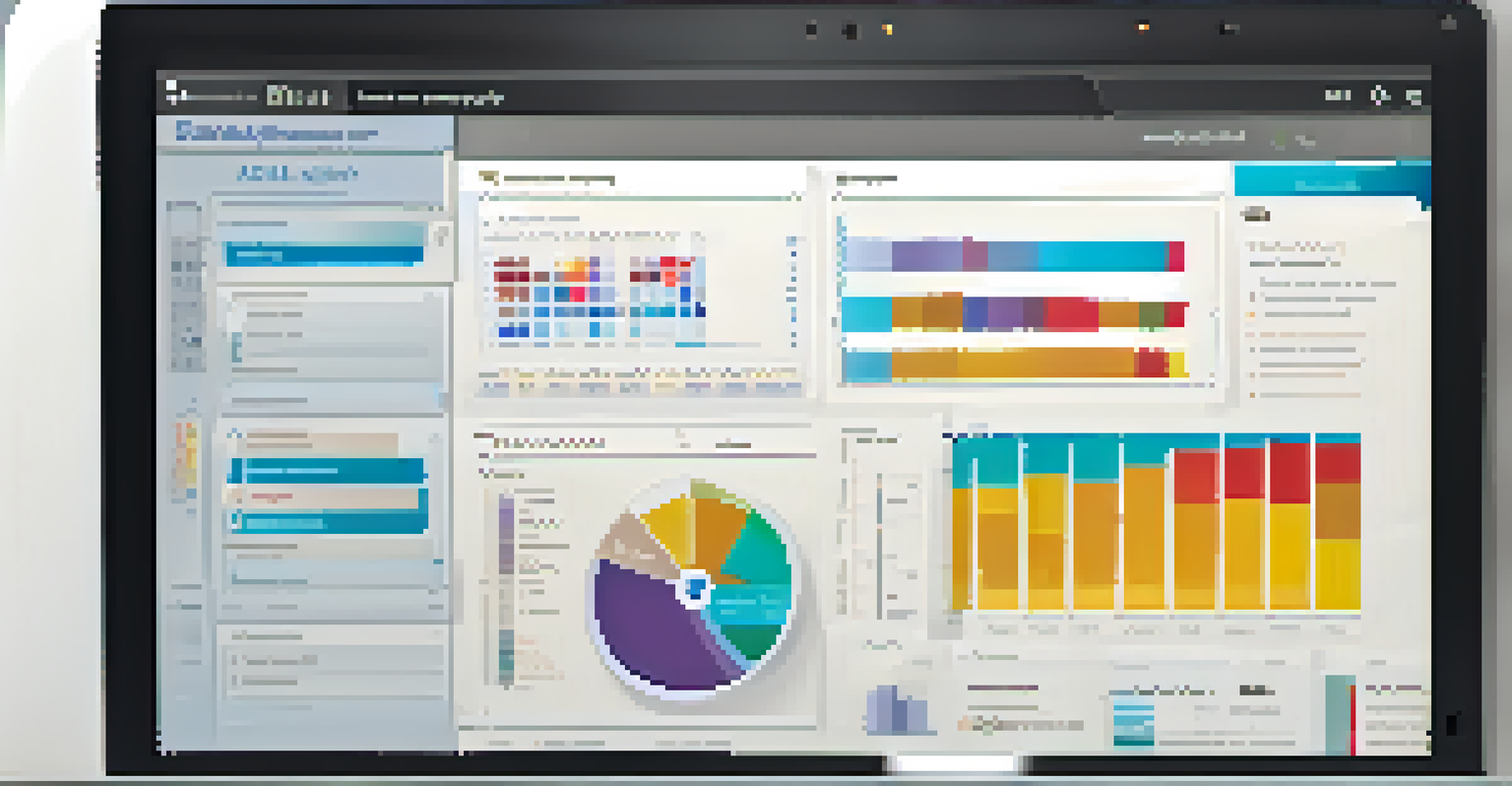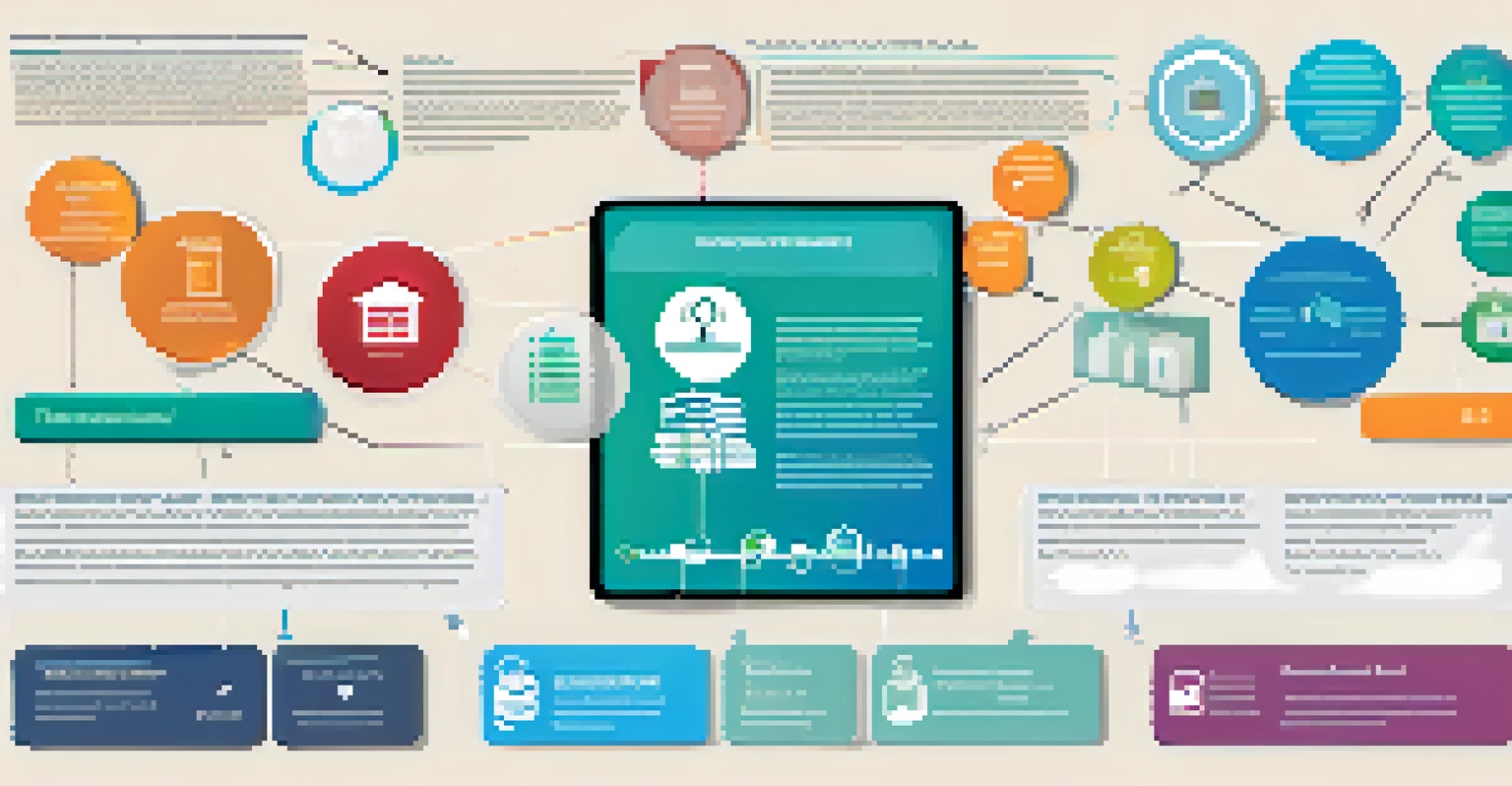The Role of Governance in EHR Management

What is Governance in EHR Management?
Governance in EHR management refers to the frameworks and processes that ensure the effective and secure use of electronic health records. It's like the rulebook that guides how data is collected, accessed, and maintained in healthcare settings. This structure encompasses policies, procedures, and standards that dictate the responsibilities of various stakeholders involved in EHR management.
Governance is not a destination, but a continuous journey of improvement and adaptation.
At its core, governance helps establish accountability, making sure that everyone from healthcare providers to IT teams knows their roles. For instance, without clear governance, sensitive patient information might be mishandled, leading to privacy breaches or data loss. By implementing robust governance, organizations can protect both patient data and their own reputation.
Ultimately, effective governance not only enhances the quality of care but also builds trust with patients. When individuals know that their health information is managed responsibly, they are more likely to engage with healthcare services. This trust is essential for improving health outcomes and fostering a positive patient experience.
Key Components of EHR Governance
EHR governance is multifaceted, typically including several key components such as data stewardship, policy development, and compliance oversight. Data stewardship ensures that the information within EHRs is accurate, up-to-date, and used appropriately. Think of it as a librarian who meticulously manages the library’s collection to ensure everyone can find the right book when needed.

Policy development establishes the guidelines for how EHR systems should be used across the organization. This includes everything from user access levels to data sharing protocols. For instance, a well-defined policy might dictate that only authorized personnel can access certain sensitive information, thereby minimizing the risk of unauthorized access.
EHR Governance Ensures Data Security
Effective governance frameworks protect patient information and enhance trust in healthcare services.
Compliance oversight is another crucial element of governance, ensuring that all practices adhere to relevant laws and regulations, such as HIPAA in the United States. By fostering a culture of compliance, organizations can avoid costly penalties and safeguard their patients' rights. Together, these components create a comprehensive governance framework that supports effective EHR management.
The Importance of Stakeholder Involvement
Involving stakeholders is vital for effective EHR governance, as it brings diverse perspectives to the table. Stakeholders include healthcare providers, IT staff, administrators, and even patients who use the health services. Their input helps to shape governance policies that are practical and relevant to real-world scenarios.
The best way to predict the future is to create it.
For example, a healthcare provider might highlight a specific workflow issue that could be addressed through better EHR policies. Engaging with frontline staff can lead to insightful improvements that enhance the system's usability, ensuring that it serves its intended purpose effectively. This collaboration fosters a sense of ownership among all parties, making them more likely to adhere to governance policies.
Moreover, involving patients in governance discussions can provide invaluable feedback on their experiences with EHRs. Understanding patient concerns about privacy or usability can help organizations refine their approaches. Ultimately, stakeholder involvement leads to a more holistic governance strategy that aligns with the needs of everyone involved.
Challenges in EHR Governance Implementation
Implementing effective governance in EHR management is not without its challenges. One significant hurdle is resistance to change among staff who are accustomed to existing workflows. When new policies are introduced, some may feel overwhelmed or skeptical, making it essential to communicate the benefits clearly.
Another challenge lies in keeping up with rapidly evolving technology and regulations. As new tools and compliance standards emerge, governance frameworks must be regularly updated to reflect these changes. This can be daunting for organizations already stretched thin with daily operations.
Stakeholder Input Shapes Policies
Involving diverse stakeholders leads to practical governance policies that improve EHR usability and effectiveness.
Additionally, ensuring consistent adherence to governance policies across various departments can be tricky, especially in larger healthcare systems. To combat this, organizations may need to invest in ongoing training and support to ensure that all staff understand their roles in EHR governance. By addressing these challenges head-on, organizations can create a more effective governance structure.
Benefits of Strong EHR Governance
Strong EHR governance brings numerous benefits that directly impact patient care and organizational efficiency. One of the primary advantages is enhanced data integrity, which ensures that the information used for clinical decisions is accurate and reliable. This, in turn, leads to better healthcare outcomes and reduced risk of medical errors.
Additionally, effective governance fosters a culture of accountability among staff, making it clear that everyone has a role in protecting patient data. When team members understand the importance of data security and privacy, they are more likely to adhere to established protocols. This proactive approach can significantly reduce the likelihood of data breaches.
Lastly, robust governance can enhance the overall reputation of a healthcare organization. Patients are more likely to choose providers with a strong track record of data security and compliance. This competitive advantage not only attracts more patients but also builds long-lasting trust within the community.
Best Practices for EHR Governance
Implementing best practices in EHR governance can significantly improve its effectiveness. One of the foundational practices is establishing a clear governance framework that outlines roles, responsibilities, and processes. This framework should be communicated widely across the organization to ensure everyone understands their part in the system.
Regular training sessions for staff are also essential to keep everyone compliant and informed about any changes in governance policies or technology. Think of these training sessions as refresher courses that keep the entire team on the same page, leading to a more cohesive approach to EHR management.
Challenges in Implementing Governance
Organizations face resistance to change and must adapt governance frameworks to evolving technology and regulations.
Lastly, organizations should prioritize regular audits and assessments of their governance practices. By continuously monitoring and evaluating their policies, they can identify areas for improvement and ensure they remain compliant with regulations. This ongoing commitment to governance excellence ultimately benefits both the organization and its patients.
Future Trends in EHR Governance
As technology continues to evolve, so too will the landscape of EHR governance. One emerging trend is the increasing use of artificial intelligence (AI) in managing and analyzing health data. AI can help streamline processes, identify potential compliance risks, and provide predictive analytics that enhances patient care. However, this also necessitates new governance frameworks to address the unique challenges AI presents.
Another trend is the growing emphasis on patient-centered governance, where patient feedback and preferences play a more significant role in shaping EHR policies. By actively involving patients in governance discussions, healthcare organizations can create systems that better meet their needs and expectations. This shift not only improves patient satisfaction but also empowers individuals to take an active role in their health journeys.

Finally, as cybersecurity threats become more sophisticated, EHR governance will need to adapt to protect sensitive data. Organizations may increasingly invest in advanced security measures and training to safeguard patient information. Embracing these trends will be essential for ensuring that EHR governance remains effective in the years to come.